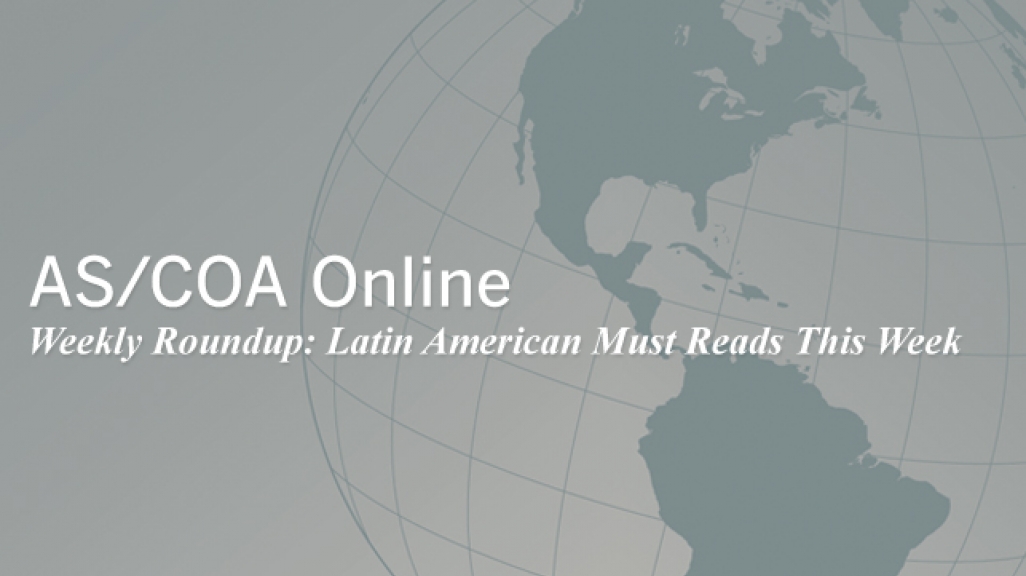Weekly Roundup: Latin American Must Reads This Week – Panama's Election, Mexico's Military Justice Reform, Brazil's Water Conflicts
Weekly Roundup: Latin American Must Reads This Week – Panama's Election, Mexico's Military Justice Reform, Brazil's Water Conflicts
Bolivia's electoral authorities set a date for the next national vote, Latin America makes slow progress on counterterrorism efforts, and Venezuela faces a potential pasta shortage.
Panama to pick its next president. On May 4, Panamanians head to the polls to elect their next president for a five-year term. José Domingo Arias of the ruling party Democratic Change faces off against former Panama City Mayor Juan Carlos Navarro of the Democratic Revolutionary Party and Vice President Juan Carlos Varela of the Panameñista Party, as well as four other minority candidates. Although Arias has been considered the frontrunner, polls show a close race between the three leading candidates, with one poll from last week even placing Navarro ahead. Arias has campaigned on expanding President Ricardo Martinelli’s social programs, but the opposition has focused on corruption within the current administration. Martinelli's wife is running as Arias' vice president, which generated debate about the legality of her candidacy.
Mexico passes military justice reform. Mexican legislators voted this week to restrict military jurisdiction to crimes involving only military personnel, writes The Pan-American Post.
A spoonful of sugar won't help U.S.-Mexico trade ties. The U.S. International Trade Commission will vote May 9 on whether Mexican sugar jeopardizes the U.S. sugar industry and if it will issue import duties. If the U.S. government takes action, Mexico may respond tit for tat on duties, writes McClatchy.
311-style mobile app gives Brazilians a channel to City Hall. An award-winning smartphone app with 50,000 users is helping Brazilians report local problems to city governments, writes Fast Company.
Brazil’s water conflicts on the rise. The country hit a record of 93 disputes in 2013, reports the Land Pastoral Committee, which has measured water conflicts since 2002. Brazil has ample water resources, but conflicts stem from water use and preservation, construction of hydropower plants and dams, and land appropriation.
Bolivia’s electoral authorities set an election date. On October 12, the Andean country will hold presidential and legislative elections as President Evo Morales seeks a third term in office. In the case of a runoff, Bolivians will vote on December 7.
Report: LatAm improved counterterrorism efforts...somewhat. Corruption and weak legislation were among top reasons for slow progress, shows the State Department's Country Reports on Terrorism 2013, released this week. Transnational criminal organizations continue to pose a threat.
How many Hispanics will really be following the World Cup? An English-language poll says that only 16 percent of Latinos will follow the World Cup closely, but data may exclude the U.S. Spanish-speaking population. In 2010, 60 million Americans over age five spoke a language other than English at home, with 62 percent of them speaking Spanish or Spanish Creole.
Forecasted LatAm and Caribbean growth rate dips. The Economic Commission for Latin America and the Caribbean released projections this week showing the region’s average growth will reach 2.7 percent this year, lower than previously expected.
Press freedom in the Americas declines. The Western Hemisphere regional press freedom score is at its lowest in five years, finds Freedom House's Freedom of the Press 2014 report, released this week. The study also found that just 2 percent of Latin America’s population lived in “free media environments.”
A pending spaghetti shortage in Venezuela? Unable to receive dollars from the government to import wheat, Venezuela’s largest privately held company halted pasta production this week. The Andean country is the largest per capita consumer of pasta in the world after Italy.






